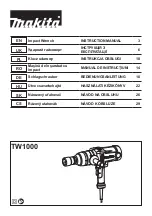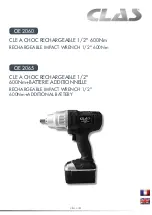
2
BATTERY TOOL USE AND CARE
PERSONAL SAFETY
GENERAL POWER TOOL SAFETY WARNINGS
WORK AREA SAFETY
ELECTRICAL SAFETY
POWER TOOL USE AND CARE
Keep work area clean and well lit.
Cluttered or
dark areas invite accidents.
Do not operate power tools in explosive atmos-
pheres, such as in the presence of
À
ammable
liquids, gases or dust.
Power tools create sparks
which may ignite the dust or fumes.
Keep children and bystanders away while operat-
ing a power tool.
Distractions can cause you to lose
control.
Power tool plugs must match the outlet. Never
modify the plug in any way. Do not use any
adapter plugs with earthed (grounded) power
tools.
Unmodi
¿
ed plugs and matching outlets will
reduce risk of electric shock.
Avoid body contact with earthed or grounded
surfaces, such as pipes, radiators, ranges and
refrigerators.
There is an increased risk of electric
shock if your body is earthed or grounded.
Do not expose power tools to rain or wet condi-
tions.
Water entering a power tool will increase the
risk of electric shock.
Do not abuse the cord. Never use the cord for car-
rying, pulling or unplugging the power tool. Keep
cord away from heat, oil, sharp edges or moving
parts.
Damaged or entangled cords increase the risk
of electric shock.
When operating a power tool outdoors, use an
extension cord suitable for outdoor use.
Use of
a cord suitable for outdoor use reduces the risk of
electric shock.
If operating a power tool in a damp location is
unavoidable, use a ground fault circuit inter-
rupter (GFCI) protected supply.
Use of an GFCI
reduces the risk of electric shock.
Stay alert, watch what you are doing and use
common sense when operating a power tool. Do
not use a power tool while you are tired or under
the in
À
uence of drugs, alcohol or medication.
A
moment of inattention while operating power tools
may result in serious personal injury.
Use personal protective equipment. Always
wear eye protection.
Protective equipment such
as a dust mask, non-skid safety shoes, hard hat or
hearing protection used for appropriate conditions
will reduce personal injuries.
Prevent unintentional starting. Ensure the switch
is in the off-position before connecting to power
source and/or battery pack, picking up or carry-
ing the tool.
Carrying power tools with your
¿
nger
on the switch or energizing power tools that have
the switch on invites accidents.
Remove any adjusting key or wrench before
turning the power tool on.
A wrench or a key left
attached to a rotating part of the power tool may
result in personal injury.
Do not overreach. Keep proper footing and bal-
ance at all times.
This enables better control of the
power tool in unexpected situations.
Dress properly. Do not wear loose clothing or
jewelry. Keep your hair and clothing away from
moving parts.
Loose clothes, jewelry or long hair
can be caught in moving parts.
If devices are provided for the connection of
dust extraction and collection facilities, ensure
these are connected and properly used.
Use of
dust collection can reduce dust-related hazards.
Do not let familiarity gained from frequent use of
tools allow you to become complacent and ignore
tool safety principles.
A careless action can cause
severe injury within a fraction of a second.
Do not force the power tool. Use the correct
power tool for your application.
The correct power
tool will do the job better and safer at the rate for
which it was designed.
Do not use the power tool if the switch does not turn
it on and off.
Any power tool that cannot be controlled
with the switch is dangerous and must be repaired.
Disconnect the plug from the power source and/
or remove the battery pack, if detachable, from
the power tool before making any adjustments,
changing accessories, or storing power tools.
Such preventive safety measures reduce the risk of
starting the power tool accidentally.
Store idle power tools out of the reach of children
and do not allow persons unfamiliar with the
power tool or these instructions to operate the
power tool.
Power tools are dangerous in the hands
of untrained users.
Maintain power tools and accessories. Check for
misalignment or binding of moving parts, break-
age of parts and any other condition that may
affect the power tool’s operation. If damaged,
have the power tool repaired before use.
Many ac-
cidents are caused by poorly maintained power tools.
Keep cutting tools sharp and clean.
Properly
maintained cutting tools with sharp cutting edges
are less likely to bind and are easier to control.
Use the power tool, accessories and tool bits etc.
in accordance with these instructions, taking into
account the working conditions and the work to
be performed.
Use of the power tool for operations
different from those intended could result in a hazard-
ous situation.
Keep handles and grasping surfaces dry, clean
and free from oil and grease.
Slippery handles and
grasping surfaces do not allow for safe handling and
control of the tool in unexpected situations.
Recharge only with the charger speci
¿
ed by the
manufacturer.
A charger that is suitable for one type
of battery pack may create a risk of
¿
re when used
with another battery pack.
Use power tools only with speci
¿
cally designated
battery packs.
Use of any other battery packs may
create a risk of injury and
¿
re.
WARNING
Read all safety warnings, instructions, illustrations and speci
¿
cations provided
with this power tool.
Failure to follow all instructions listed below may result in electric shock,
¿
re
and/or serious injury.
Save all warnings and instructions for future reference.
The term "power tool" in
the warnings refers to your mains-operated (corded) power tool or battery-operated (cordless) power tool.
•
Hold the power tool by insulated gripping sur-
faces, when performing an operation where the
fastener may contact hidden wiring.
Fasteners
contacting a “live” wire may make exposed metal
parts of the power tool “live” and could give the
operator an electric shock.
•
Wear ear protectors when impact drilling.
Expo-
sure to noise can cause hearing loss.
•
Use only sockets and other accessories spe-
ci
fi
cally designed for use on impact wrenches
and drivers.
Other sockets and accessories might
shatter or break causing injury.
•
•
WARNING:
Some dust created by power sanding,
sawing, grinding, drilling, and other construction
activities contains chemicals known to cause can-
cer, birth defects or other reproductive harm. Some
examples of these chemicals are:
•
lead from lead-based paint
•
crystalline silica from bricks and cement and other
masonry products, and
•
arsenic and chromium from chemically-treated
lumber.
Your risk from these exposures varies, depending
on how often you do this type of work. To reduce
your exposure to these chemicals: work in a well
ventilated area, and work with approved safety
equipment, such as those dust masks that are spe-
cially designed to
fi
lter out microscopic particles.
Cat. No. Volts DC
RPM
IPM
M18 FID
M18 FIWP12
M18 FIWF12
18
18
18
0 - 3 000
0 - 2 500
0 - 2 500
0 - 3 700
0 - 3 200
0 - 3 200
FUNCTIONAL DESCRIPTION
SPECIFICATIONS
1. 1/4" Hex drive chuck
(M18 FID)
2. LED
3. Control switch
4. Trigger
5. Handle
6. Speed control
7. Belt clip
8. 1/2" Square drive anvil (M18 FIWF12)
9.1/2" Square drive anvil with pin detent
(M18 FIWP12)
1
2
4
3
8
Cat. No. M18 FID
Cat. No.
M18 FIWF12
SYMBOLOGY
Volts
Direct Current
Impacts per Minute Under
Load (IPM)
No Load Revolutions per
Minute (RPM)
9
Cat. No.
M18 FIWP12
7
SERVICE
•
When battery pack is not in use, keep it away
from other metal objects, like paper clips, coins,
keys, nails, screws or other small metal objects,
that can make a connection from one terminal
to another.
Shorting the battery terminals together
may cause burns or a
fi
re.
•
Under abusive conditions, liquid may be ejected
from the battery; avoid contact. If contact acci-
dentally occurs,
fl
ush with water. If liquid con-
tacts eyes, additionally seek medical help.
Liquid
ejected from the battery may cause irritation or burns.
•
Do not use a battery pack or tool that is dam-
aged or modi
fi
ed.
Damaged or modi
fi
ed batteries
may exhibit unpredictable behavior resulting in
fi
re,
explosion or risk of injury.
•
Do not expose a battery pack or tool to
fi
re or
excessive temperature.
Exposure to
fi
re or tem-
perature above 130°C (265°F) may cause explosion.
•
Follow all charging instructions and do not
charge the battery pack or tool outside the
temperature range speci
fi
ed in the instructions.
Charging improperly or at temperatures outside
the speci
fi
ed range may damage the battery and
increase the risk of
fi
re.
•
Have your power tool serviced by a quali
fi
ed
repair person using only identical replacement
parts.
This will ensure that the safety of the power
tool is maintained.
•
Never service damaged battery packs.
Service
of battery packs should only be performed by the
manufacturer or authorized service providers.
SPECIFIC SAFETY RULES FOR
IMPACT WRENCHES AND DRIVERS
5
6
Maintain labels and nameplates.
These carry
important information. If unreadable or missing,
contact the store where the product was originally
purchased or one of our authorised
MILWAUKEE
®
service centres for a replacement.


























